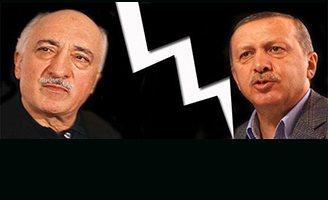Erdoğan’s War: The Causes and Consequences of the Upsurge in Kurdish Violence
By Gareth Jenkins (vol. 8, no. 15 of the Turkey Analyst)
In recent weeks, Turkey has been wracked by an escalation in Kurdish-related violence. Not only could the upsurge have been prevented but there are fears that the worst may yet be to come. The fear is that President Recep Tayyip Erdoğan may order an even harsher crackdown over the weeks ahead and that, with its rural units depleted by deployments to Iraq and Syria, the PKK may increasingly respond by staging attacks, including more suicide car bombings, in the cities.

The Coalition Crumbles: Erdogan, the Gülenists, and Turkish Democracy
By Halil M. Karaveli (vol. 5, no. 4 of the Turkey Analyst)
The authority of Prime Minister Recep Tayyip Erdoğan has been challenged by the security apparatus, the police and parts of the judiciary that enjoy the backing of the brotherhood of the Islamic preacher Fethullah Gülen. The unprecedented challenge compels Erdoğan to circumscribe the power of his erstwhile ally, which thrives with the application of oppressive security measures. Whether Erdoğan will now see the strong incentive to seek a democratic, negotiated solution to the Kurdish issue, or continue to concentrate power in his own hands, remains to be seen.

The Snake That Doesn't Touch Me: Turkey's Special Authority Courts
By Gareth H. Jenkins (vol. 5, no. 5 of the Turkey Analyst)
On February 7, 2012, Sadrettin Sarıkaya, a public prosecutor with “special authority”, attempted to question several high-ranking serving and retired officials of Turkey’s National Intelligence Organization (MİT), including intelligence chief Hakan Fidan, on suspicion of aiding and abetting the militant Kurdistan Workers’ Party (PKK). The resultant furor led not only to the ruling Justice and Development Party (AKP) rushing through legislative amendments to protect the country’s intelligence officers from judicial investigation but also to calls for the entire system of “specially authorized” prosecutors and courts to be overhauled. However, there is considerable evidence to suggest that the manner in which “specially authorized” prosecutors and courts operate are merely symptoms of much deeper flaws in the Turkish judicial system as a whole.



